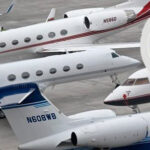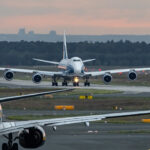
• Carriers impose 300% fare regime, N1.8m charge to amend old tickets
• Nigeria loses 5% passenger charge as travellers now buy tickets from neigbouring countries, abroad
• Lawyer petitions minister as NCAA, FCCPC keep mum • Travel agencies closing down, NANTA cries out
Apart from naira scarcity, foreign exchange liquidity crisis rocking the nation’s air transport sector has taken another ugly turn with foreign airlines tacitly refusing to sell tickets in statutory local currency.
While some airlines are demanding foreign exchange for tickets purchased locally, others have simply knocked off all inventories from the reach of travel agencies in Nigeria.
Compared with last month when only premium fares were accessible by travel agencies on official channels, the window of accessibility has been narrowed to the open market, where airfares have increased by 200 to 300 per cent.
Inquiries by The Guardian, yesterday, showed that a global average of $1,000 (or N750,000 at N750/1$ rate) per six-hour Economy Class ticket now locally sells at an average of $4,000 (or N3 million), especially for naira paying customers. Its Business Class variant averages N7 million to N10 million.
A Masters student in the United States, who was planning his return to school, Seun Oladiti, said he was at the weekend offered a return ticket at the rate of N3.7 million ($4,900).
“As of December, I got the same trip for less than N2 million but declined it as it was too expensive. Now, I was told that the only alternative was to pay in foreign currency. The bill immediately changed to $2200 (or N1.65m) for the same ticket!” he said.
The Guardian findings showed that several airlines, especially the American and European carriers, now have preference for foreign currency paying customers. The development is not unconnected with the inability to repatriate foreign exchange equivalent of tickets erstwhile sold in naira.
An airline official said that foreign airlines selling tickets in foreign currency is not general. “The operators at no time agreed not to sell in naira. By the way, those who decided not to sell in local currency also have the right justification. It is part of the survival mechanisms as mandated from the home office of the airlines concerned.
“It (not selling in naira) is not a moral argument, rather a business decision for survival purposes. If Nigeria has promised to give us dollars in exchange for ticket sales in naira, but backtracked on the agreement without warning, should airlines continue to sell in naira and keep accumulating its money in a country facing an uncertain path to the future? If your flag carrier (Air Peace) has $15 million stranded in another country, will it continue to operate? That is what I mean by survival mechanism,” he said.
Recall that since mid-2022, foreign airlines have been embroiled in a repatriation crisis over the inability to access foreign exchange from the official window of the Central Bank of Nigeria (CBN).
The International Air Transport Association (IATA), the clearing house for over 290 global airlines, in November, listed Nigeria in the top five markets with foreign airlines’ blocked funds (excluding Venezuela).
Nigeria was estimated to hold the lion share of $551 million; Pakistan, $225 million; Bangladesh, $208 million; Lebanon, $144 million and Algeria, $140 million.
IATA’s Regional Vice President for Africa and the Middle East, Kamil Al-Awadhi, had warned that countries that keep foreign airlines’ funds in the local economy would be exposed to dire consequences, which include, a downstream effect of 200 to 300 per cent fare hike.
Though an intervention by CBN led to a pledge to release $265 million in August, leaving a balance of $200 million, the situation has remained the same. Indeed, the stranded funds keep piling by daily sales of tickets, to warrant Emirates Airlines quitting the Nigerian route in October 2022. As at the last check, industry sources said the current accumulation is well over $560 million.
President of the National Association of Nigerian Travel Agencies (NANTA), Susan Akporiaye, said the stuck fund crisis had turned for the worse lately, and much to the pains of Nigerian travellers and travel agents that are getting thrown out of their means of livelihood.
Akporiaye noted that the association’s public outcry, late last year, led to the release of the remaining 50 per cent of CBN’s $265 million pledge to the foreign airlines. It brought temporary relief as some carriers made lower inventories accessible to the Nigerian market late in November and December.
“But now, things are back to status quo,” she said wearily. “The truth is that the market is worse than before. This is because the lower classes that were released then and sold by the travel agencies are no longer available. So, if booked customers want to make changes to those tickets that were bought at N800,000 (about a month ago), they will have to pay as much as N1.7 million to N1.8 million because those classes have been taken out of the system.
“When this initially happened, there was a system in place through which we could reach out to the airlines, but now that is no longer there. The report we got from the airlines is that they are not allowed to make changes for travel agencies in Nigeria. Hence, we should sell whatever we see on the system, ‘pay N1.8 million for changes or just forfeit your travel.’
“That is where we are, which is so unfair to Nigerian travellers and to us. It is Nigerians that are bearing the brunt, just because they have the need to travel. It is also unfair to us travel agencies because it is our lives that the airlines and government are toying with,” Akporiaye said.
The NANTA president added that a lot of travellers were finding other means to get cheap airfares from neigbouring countries or buying the same from overseas, which boycotts the local travel agencies and local conditions.
“Tickets are not necessarily cheaper in other countries, but the fact is that there are lower inventories unlike here. So, we (travel agencies) have been left hanging with no sales.
“Yes, flights are still getting full in Lagos and Abuja Airports, but most of these tickets are no longer issued by us.
“Nowhere in the world will you find a six-hour Economy Class ticket being issued above $1,000, but here it is $4,000. That is outrageous, exploitative and sad. It is not acceptable to us,” the president said.
Chairman of the Airlines and Passengers Joint Committee (APJC) of IATA, Bankole Bernard, reckoned that foreign airlines that stayed back in the country, despite earlier threats of withdrawal, had done so just to “milk and maximise returns at the expense of the travelling public” – because the government either does not understand the market dynamics or not paying attention to issues.
Noting that it was unfortunate, Bernard said the foreign airlines that are charging in foreign currencies and blocking lower inventories, among other means to avert excess funds being trapped in Nigeria, could not really be blamed.
“There is a contractual agreement with airlines to sell in naira and get dollar equivalent in return. But CBN is now saying that the airlines are not her priority after the carriers had sold in naira. Is that fair? Let us also put ourselves in their shoes,” he said.
Most unacceptable for him, however, is the tone of deafness that has been turned to the off-putting plight of the industry.
“The Nigeria Civil Aviation Authority (NCAA) statutorily earns five per cent charges for every ticket sold in Nigeria. For several months now, most of the tickets Nigerians use are bought from other countries, which means we are losing revenue. So, how come nobody is bothered despite the heavy loss in revenue compared to the previous year? There is a problem. It means that they have not been relying on that revenue stream.
“The airlines have just been coming here to exploit and we are not complaining. It will surely get to the point of selling in dollars. The planes are getting filled up because even travel agencies are partnering with their counterparts abroad, to buy and sell tickets for Nigerians and remain in business. It is a crazy situation, but what choice are people left with?” Bankole queried.
When contacted on the claim of foreign airlines exploiting Nigerians, a senior official of the Federal Competition and Consumer Protection Commission (FCCPC) said the body was unaware of the complaints “as the matter has not been reported to FCCPC.”
Apparently miffed by the foreign airlines charging local currency in Nigeria, Dr. ‘Yemisi Koya, has urged the Minister of Aviation, Hadi Sirika, to treat the development as an attack on national sovereignty.
Koya, who is the Head of Alabukun Law Chambers (ALC), in a petition dated January 20, 2023, and sighted by The Guardian, said the requirement is repugnant to the sacred ideals of Nigeria’s sovereignty.
He explained that in other countries, it would be totally inconceivable for any Nigerian enterprise to compel payment for purchases there in Naira and Kobo.
“The torrents of the attendant denunciation, at such an audacious attempt by Nigeria to denigrate their sovereignty, would reverberate rebuke globally. Nigeria must be accorded the same deference,” he said.
The CEO of ALC added that companies accorded the opportunity to conduct business in Nigeria were obligated to respect its sovereignty.
“Any adverse stance constitutes an act of hostility and is unequivocally unacceptable. The imposition of such reprehensible terms of payment is a brazen affront to the nation and citizenry granting those enterprises the privilege to transact business in Nigeria. It is patently unconscionable and a departure from the essence of corporate social responsibility.
“It is incumbent on the government to incisively excoriate this ignominy and assure the preservation of the nation’s sovereignty. In this governmental responsibility, citizens must remain hopefully assured,” the petition read in part.












